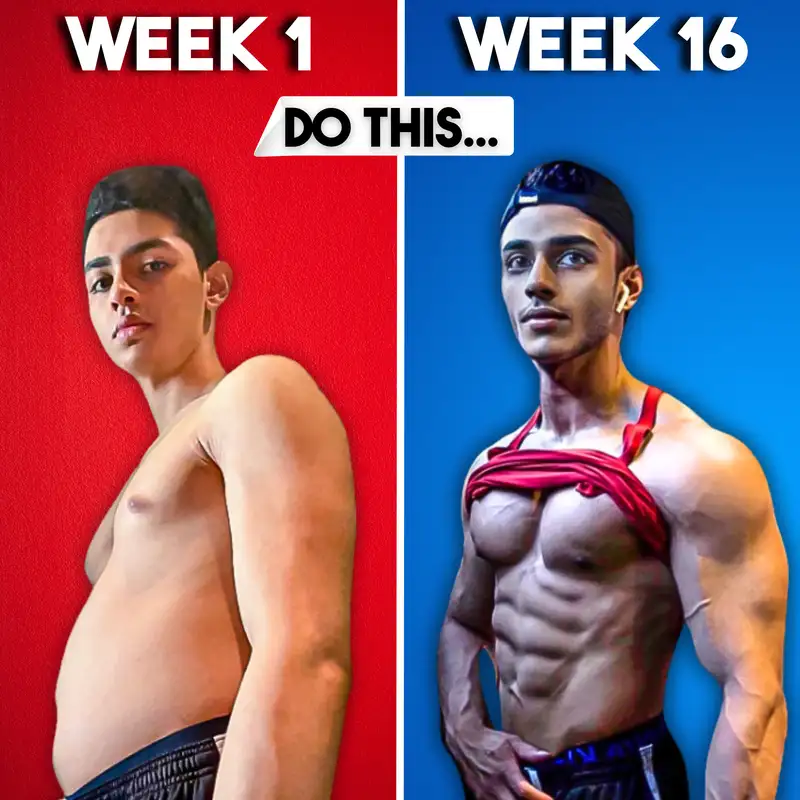Doctor Explains How to Lose Fat and Build Muscle at the Same Time (Step by Step)
How can you build muscle and lose fat at the same time? There's so many people on the internet thinking that you can only lose fat by going on a cut and you can only build muscle by going on a full on bulk. So this has made it into the mainstream from popular bodybuilding information over the years and it's led to people going into huge caloric surpluses to build a bunch of size and then trim down for a competition, but the scientific evidence has challenged this. For example, 2013 study from Garth and colleagues found that even when they overfed subjects by 600 extra calories per day, they actually didn't gain a lot more muscle but did gain over 3 times the fat mass. So, nearly all the extra bulk came as fat.
Speaker 1:Now, I personally don't have anything against cutting and bulking in the right circumstances, it makes absolute sense and I've definitely been in stages where I actually went up to 97 kilos putting on a significant amount of mass as well as fat mass. I do believe the significant extra amount of calories did help in that muscle building process in a condensed time frame. It is very possible to build muscle without a large surplus but most people do accept the fact that they're going to gain some fat along with the muscle tissue. So, I've broken down the math explaining why this is possible to gain muscle sustainably without gaining a significant amount of fat mass. And, most people will say building muscle and losing fat at the same time is possible but not practical and here's the thing, it applies in certain circumstances and these scenarios I'll run you through step by step.
Speaker 1:So, when we talk about losing fat and building muscle at the same time we're talking about body recomposition and this is possible for a lot more people than you may think. So, the circumstances where body recomposition is possible is first of all for newbie lifters so people in their early stages of lifting and dieting properly. This is because new lifters are most primed for muscle growth and the calories that are pulled from stored body fat to fuel the muscle building process can be utilized with basic progressive resistance training and a reasonable diet. 2nd, because the overweight individuals usually have larger energy reserves stored in the body fat. So, they can eat in a caloric deficit and still have plenty of stored energy to feel the muscle building process.
Speaker 1:3rd, detrained individuals, so people who were in shape before but then stopped training due to injury or other commitment. So there's going to be some sense of muscle memory in the rebuilding process making building muscle a lot easier. And 4th, the people using anabolic steroids. So they tend to be able to build muscle a lot more quickly and have tendencies to burn fat a little easier as well. So, even if body recomposition were limited to only these 4 groups of people, if you walk into most gyms, most people do actually fall into one of these 4 categories.
Speaker 1:For example, even if you've been in the gym for several years, you might still fall on newbie category if you haven't been training nearly as hard enough or smart enough over the years. I'd also add another category here to the list, sub optimized trainees. So, this would include anyone who's been going to the gym for a while and they may even consider themselves intermediate or advanced level lifters by training age, but deep down haven't really been putting in their best effort with their training or nutrition and there are studies where body recomposition happens in lots of advanced lifters most of the time. Once people really start paying attention to details at a higher level such as nutrient timing, optimising their macronutrient intakes, we can see recomposition occur. There's been studies where athletes have gained £20 of lean muscle in 10 weeks and lost fat mass at the same time with properly programmed nutrition and properly programmed resistance training, body recomposition can occur more often than you think.
Speaker 1:So, there is a subset of population that recomposition wouldn't be practical for and that's truly advanced trainees already with a perfectly optimised training schedule in nutrition who are near the genetic ceiling. But this is actually a very obscure scenario and only really occupies a very small percentage of people. Let's break down how we can actually go about body recomposition. So, you can have the most optimised diet in the world with plenty of protein, but you need progressive training as a stimulus for you to actually build muscles. So, in this analogy we can think of our training as the engine and our nutrition as the gasoline to fuel performance.
Speaker 1:So, the better the fuel the better the performance. However, without the engine the car simply won't move, you won't be able to build the muscle. So regardless of the fuels quality we can also think of sleep and stress management as the oil changes and tire rotations are required to keep things moving. So when it comes to training, you want to focus on progressive overload, applying effort and using proper technique. And once you have the fundamentals in place, fine tune your volume to fit your advancement levels.
Speaker 1:Generally speaking, 10 to 20 sets per week per body part is a good ballpark for most people and most muscle groups. Next, you need to decide on a primary goal even though you may want to do both at the same time. It's important to establish which is more important for you. For example, if you're currently on the leaner side, let's say 80% body fat as a male or 18 to 20% as a female then your primary goal should probably be to build muscle. And if you're not so lean, so somewhere between let's say 15 to 20% plus as a guy or 25 to 30 percent plus as a woman then maybe your primary goal should be to lose fat.
Speaker 1:And once you've decided on your primary goal, next you want to center your caloric intake around maintenance calories, the number of calories you need to eat to maintain your weight. And, if your primary goal is to build muscle, you should enter into a slight caloric surplus adding 5 to 25% of your maintenance intake. If you're on a leaner, less advanced, if you're more genetically gifted you can get away with a larger caloric surplus. Now if your primary goal is to lose fat you should enter a slight caloric deficit slashing 10 to 20% of your maintenance intake. The more fat you have to lose the bigger the deficit should be.
Speaker 1:There are other considerations to be made such as if you're detrained, highly advanced, skinny fat or significantly overweight. Next, you need to set up your macronutrient targets starting with protein, the most important macro for recomposition. So, I'd recommend a sliding model for protein intake based on the lean body mass. Where the leaner you are, the closer you should be to 1.6 grams per pound of lean body mass. And the more body fat you have, the closer you should be to 1.2 grams per pound of lean body mass.
Speaker 1:I currently weigh £175. I personally go a bit above what's required just because I feel it's more satiating and I like having that in my diet as well. A higher intake is both safe and advised for those looking to recon. From here you want to determine your fat and carbohydrate intake. So, personally I set my fat intake to around 20% of my total caloric intake then fill it in with the rest of carbs.
Speaker 1:So, the 5th and the final step to achieving body recomposition is to pay attention to the details. This step may not be required for beginners, they can just recomp with the first four steps, but as we get more advanced, it becomes a bit more difficult so we need to optimize. And what's sleep? Sleep is probably the single most underrated factor when it comes to transforming your physique. A 2018 study split 36 subject into 2 groups that both entered a caloric deficit.
Speaker 1:Except one group slept 1 hour less, 5 nights per week and they were also allowed to sleep 1 hour extra on the weekends to catch up. As it turns out, after 8 weeks of dieting, weight loss was the same in both groups, but the group that slept well lost 83% of their weight from fat whereas the sleep restricted group lost 85% of their weight as lean muscle mass which is absolutely crazy. And it's also worth mentioning that these subjects weren't weight training. So lifting probably would have flattened out the results but I don't think it would have been enough to offset the enormous difference that sleep made. So, the next area we can look into is optimising our approach around nutrition and workouts.
Speaker 1:So, first thing is the timing of the nutrients around the workouts. Now, I already discussed some of the misconceptions around this topic. We can also look into supplements to optimise. But it's worth mentioning there aren't any supplements that cause recomposition on their own. However, there are a few worth mentioning that can help.
Speaker 1:So at the top of the list we have the base protein powder, then creatine, caffeine is also brilliant but protein powder is especially important for vegan lifters. So, I recommend the so called vegan whey, a blend of rice and pea protein that offers a full spectrum of amino acids and has a high leucine content. Wake up protein can also be used at any time of the day to help make meeting total daily protein goals a lot easier. And casein before bed might help slow down the digestion throughout the night. Next, creatine, by far the most well studied and researched supplement on the market and given how cheap it is and how there are no real side effects it's a pretty easy choice to add in.
Speaker 1:So 3 to 5 grams of creatine monohydrate per day is a brilliant choice. Next, caffeine. Mainly for prolonging the time of fatigue so you can increase the performance in your workout and there's also acute fat oxidation. But unlike creatine, caffeine is also susceptible to taurines. So, it's probably smart for you to reserve it for your heaviest or most demanding training sessions and periodically cycle off of it as well.
Speaker 1:If you want to learn more about how to lose the fat sustainably and build muscle with proper exercise and nutrition regimes and you need some advice, drop me a message on Instagram. Like the video if you like the content, and subscribe for more content on how you can lose fat and build muscle in a sustainable manner without restrictive dieting, endless cardio or unnecessary use of medication.

